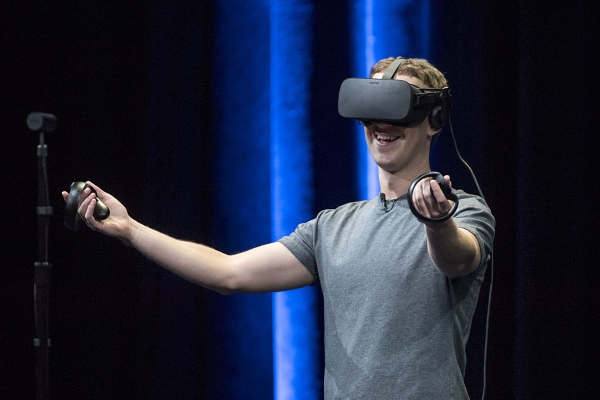[I believe presence is a powerful tool and that presence scholars and creators have a particular responsibility to consider, warn against, and work to prevent its use for unethical ends. Reminiscent of a Black Mirror story, this cautionary opinion column explores the potential of presence-evoking technology to subvert the mechanisms that prevent the most extreme forms of societal inequality. It was published in Bloomberg View. –Matthew]

[Image: Enjoy. Photographer: David Paul Morris/Bloomberg]
Are You Poor? Here’s Your Virtual Hamster Cage
Technology could erase the limits of inequality.
By Cathy O’Neil
February 21, 2018
What are the limits of inequality? In a world with virtual reality, history might be an unreliable guide.
Time was you could imagine a peasant revolt: If the poorest were starving, they wouldn’t wait around patiently for political change. Riots would disrupt the status quo. If things were really bad, the army might join in. Self-preservation would then compel elites to respond by redistributing wealth, rather than continuing to hoard resources. For a while, society would be more equal.
In the developed world, however, the poor aren’t necessarily poor enough for that scenario to play out. Instead, the folks at the bottom of the wealth spectrum live in a grey area of hopelessness, opioid addiction and other slow-motion suicide on the one hand, and Medicaid work requirements, drug tests, and other attempts to shame them as undeserving on the other.
I can picture three ways society might go from here. The first is the worst-case sadistic scenario: The poor become so dehumanized that their suffering moves nobody, opening the way to institutionalized neglect. The best-case scenario is the unlikely but utopian Star Trek singularity. Finally, the middle scenario involves meeting basic needs and stimulating pleasure centers but not much more.
The U.S. is arguably well down the sadistic road. Consider, for example, reports that Facebook has figured out how to determine a person’s class based on information such as education and internet use. Such technology could allow advertisers to ignore — or target — entire swathes of users according to their place in the social hierarchy (as opposed to their race, a practice with which Facebook has had some issues). What could possibly go wrong?
For one, given Facebook’s reach and influence, it could directly increase inequality. The well-educated rich might see only ads for plum jobs and credit with great interest rates — all of which help them get richer. The poor might see predatory loans and useless for-profit college “educations,” all of which help them get poorer. As people became commoditized, sized up exclusively by their assumed ability to pay, their online environments would increasingly reflect their physical environments and define their life options.
Note that the sadistic scenario requires no deliberate decision to put the poor at a disadvantage. It’s merely a series of business decisions that creates a class of people who seem never to make wise choices or end up better off than expected, adding to the narrative that they’re undeserving. The lucky cannot understand them, because they do not experience the same environment — until or unless the poor get so fed up that they revolt.
Now let’s picture the utopian case — where every human gets the space, means and resources needed to pursue happiness. I call it the Star Trek singularity, to distinguish it from the singularity you’ve heard futurists worry about, in which computers take over and try to kill us. It’s the moment where we decide that human dignity is of paramount importance, and we learn how to use technology to enhance human experience instead of prey upon the poor. It requires some stretches of the imagination, such as the advent of replicators and endless energy supplies, to overcome predictions that we’ve reached the point — or will soon reach the point — where we can’t feed, house, and care for all the world’s citizens. As much as I dream about this, I deem it unlikely.
Finally, there’s the middle ground. Society sees to the most basic needs of people considered “eligible” — a category that would probably exclude citizens of other countries, felons and political extremists. The lower rungs get relegated to what I would call deluxe virtual-reality hamster cages — pods in which they can freely and endlessly experience virtual lives in which they’re beautiful, sexy and admired, in which they have access to any book ever written or any 4chan post or conspiracy theory they want to explore (opioid drip optional). Addictive, but in endless supply. The artificial nature of their existence differentiates them from the more privileged, who actually interact with each other. The wealthy gallivant around on private jets, having real rather than virtual sex.
Would such a society be stable? It’s entirely possible, if the technology is good enough. Would it be fair? I imagine the lucky might say “yes.” After all, the algorithms would have predicted that their lives would turn out this way.
—
This column does not necessarily reflect the opinion of the editorial board or Bloomberg LP and its owners.